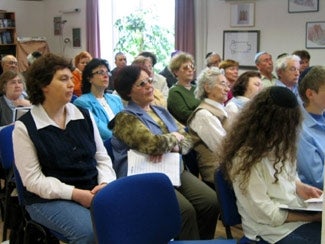HANOVER, Germany (JTA) — In 1982, Rachel Dohme was looking for a place to pray — far from the familiar surroundings of her native Pittsburgh. Dohme, now 54, had just moved to Germany, where her husband is a mushroom grower. The closest congregation to her new home of Hameln, population 5,000, was in Hanover, about an hour’s drive away. “I went to the door of the synagogue, and the man wouldn’t speak to me,” she remembers. “He just made a fist and pointed his thumb up. I didn’t get it. Then he did it again. I finally realized it meant I had to go upstairs to the gallery. I grew up in the Conservative movement and I was really surprised. “Looking down at the men from the balcony, I realized this was not for me,” she adds. “I wanted to go to a synagogue where my daughter could be called to read the Torah.” With no such institution around, she founded one herself. Dohme’s tale is not an aberration. Many transplanted Americans attending a recent regional conference here of the World Union for Progressive Judaism said they were shocked to find only Orthodox synagogues in their adopted European homes. Several of them — often women — went on to create new, egalitarian congregations amid Europe’s predominately Orthodox, and often insular, Jewish landscape. The trailblazers include secular Jews from the United States who began taking a greater interest in Jewish life when they realized that without their efforts, progressive Judaism might not exist on the Continent. In addition to Dohme, this group includes: • Arthur Buchman, a 63-year-old psychologist who moved to Copenhagen from Massachusetts. He wanted to teach his young daughter about Judaism, but found it difficult to do so because “there was no non-Orthodox rabbi in Denmark.” So he and a group of American Jewish expatriates formed a religious study group in 1998 that grew into Friday night services, and eventually morphed into a congregation — Shir Hatzafon — that now has about 300 members, both Danes and immigrants. • David Ross, a 60-year-old retired U.S. diplomat who now runs a villa-rental and tour agency in Milan. In 2002, he co-founded the first progressive congregation in Italy, where it is sometimes difficult for foreigners to join existing Jewish communities. Newcomers seeking official acceptance must produce extensive documentation of their Jewish lineage along with certification from an Orthodox rabbi. “It is sometimes a lengthy approval process,” explains Ross, president of Milan’s congregation Beth Shalom, “and Americans in particular find it off-putting.” • Lauren Rid, 43, like Dohme, moved to Germany where her husband had business interests. With only Orthodox institutions to choose from, she instead joined a group of liberal expatriate Jews who formed a group in Munich in the late 1980s that eventually became Beth Shalom, Germany’s first progressive congregation since World War II. “It’s not that I was looking for something American,” says Rid, a mother of three from Long Island. “I was looking for something in which I could participate fully, as an equal, where men and women could exchange ideas and grow spiritually by studying the Torah. That simply wasn’t available before.” As for Dohme, the congregation she founded in Hameln began as a one-woman social service agency for the many poor and assimilated Russian Jews who had immigrated to the area starting in the early 1990s. Dohme first provided for the Soviet immigrants’ basic needs, supplying them with clothing and language courses while convincing her friends to invite the newcomers into their homes for a taste of German culture. She then started teaching the Russian children how to celebrate the Jewish holidays. Having already earned the gratitude and friendship of the new immigrants, she was able to assemble a congregation that featured worship services, study sessions and even lectures from visiting Torah scholars. “Really, I was just looking for people to share my Judaism with,” explains Dohme, whose non-Jewish German husband has helped support the congregation financially. She says she typifies “many American expatriate women who want to practice the Judaism they grew up with, which means our daughters can fully participate in temple life.” It’s worth noting that Dohme’s teenage daughter, Rebekka, now often serves as the cantor at the Jewish Congregation of Hameln. Having grown to 250 members, the congregation now rents space in a spruced-up textile factory. But Dohme has a dream: It involves securing the site of the town’s former synagogue that was burned down by Nazis on Kristallnacht in 1938. In a stroke of pure coincidence, Arnold Oppler, the great grandson of that synagogue’s architect, Edwin Oppler, stumbled on the Hameln congregation’s Web site and contacted Dohme. He has since crafted a master plan for building a new synagogue at the site of his father’s creation. “Of course we need money to get this done,” Dohme says. “Our group is still comprised mostly of new immigrants who don’t have that kind of cash.” Dohme says her biggest challenge, besides scraping up funds for a synagogue and a full-time rabbi, is trying to reach Jews who have had almost all traces of religiosity expunged by the Soviet Communist regime. But as the photographs of bat mitzvahs, Chanukah parties, and other Judaic life cycle events lining the walls of the Hameln congregation attest, at least some of the Russians who settled in Hameln have embraced Jewish togetherness. “One of the Russians in our community, a dyed-in-the-wool Communist atheist, said the only reason he knew he was Jewish when he came to this country was the ‘J’ in his passport,” Dohme says. “Now he says he has to learn what it means to be Jewish because the ‘J’ is not there anymore, and he has become one of our most active members.”
JTA has documented Jewish history in real-time for over a century. Keep our journalism strong by joining us in supporting independent, award-winning reporting.






